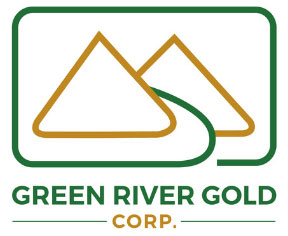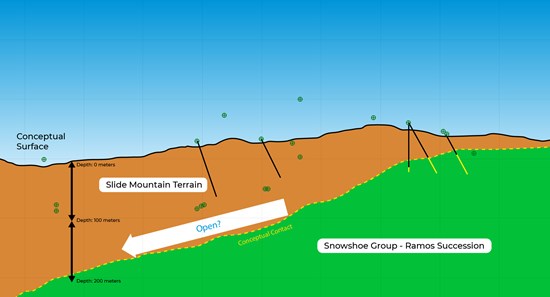Edmonton, Alberta- Green River Gold Corp. (CSE: CCR) (OTC Pink: CCRRF) (the “Company” or “Green River“) is pleased to announce that the Company is currently drilling its 46th hole on the Quesnel Nickel Project and that the XRF results indicate mineralization similar to the previous 45 drill holes, once again beginning at the bedrock surface. The drilling results are from the Company’s 100%-owned Quesnel Nickel Project, located 40 kilometers east by road from the Company’s shop and operations center in Quesnel, British Columbia, in the prolific Cariboo Mining District in South Central British Columbia, Canada. Since late in the calendar year 2021, the Company has drilled 45 holes at various locations spanning almost 10 kilometers of the total 14-kilometer length of the Deep Purple magnetic anomaly. All of the holes show XRF results indicating nickel, magnesium, cobalt, and chromium beginning at the surface of the bedrock and continuing to depth. Assays have been done on some of the holes and the assays have confirmed the presence of mineralization from surface.
Kyle Townsend, the Mine Manager for Green River Gold Corp., says, “We continue to demonstrate the size and consistency of the nickel showing at the Quesnel Nickel Project, with our 45th consecutive drill hole intersecting mineralization from the bedrock surface. These results confirm the presence of nickel, magnesium, cobalt, and chromium over approximately 10 kilometers, further highlighting the significant potential of this project.”
The Company is pleased to report the assay results from WK-23-01, the first drill hole completed in the 2023 drilling season. A portion of these results, relating to a distinct, strong serpentine alteration zone, were reported on earlier (see Press Release dated June 12, 2023) The assay results have now been received for the entire length of the hole which was drilled to a total depth of 120.9 meters (see Table 1). The assay results for the entire hole once again echoed the previously reported XRF results for hole WK-23-01 with regard to the nickel, cobalt, chromium and magnesium concentrations. The concentrations were consistent with the 42 holes drilled in late 2021 and over the course of 2022. Table 2 shows the assay results for the center section of the semi-massive sulphide zone. The drillers encountered 12.8 meters of glacial till, or gravel, before reaching bedrock in WK-23-01. Glacial till is typical in the Cariboo region. Many earlier drill holes were drilled from outcrops that encountered no glacial till.
Table 1. Assay results for drill hole WK-23-01.
Table 2. Sample result for the Semi-massive sulphides section.
Drill hole WK-23-01 was collared approximately 900 meters southeast of Zone 1, situated between Zone 1 and Zone 2 (refer to Figure 2). During this drilling, a distinct alteration zone characterized by strong serpentinization was encountered from a depth of 47.4 meters to 50.8 meters. The serpentinized alteration zone is visually emphasized in red on the WK-23-01 cross-section (as depicted in Figure 1). Analysis of samples obtained from the MSA laboratory in Langley, BC reveals that WK-23-01 contains an average of 0.187% nickel, 0.009% cobalt, 0.0963% chromium, and 20.8% magnesium. Notably, the central section of the altered zone, spanning from 48.3 meters to 48.9 meters, exhibits substantial quantities of zinc (0.758%), lead (0.434%), silver (5.3 ppm), and significant gold (0.158 ppm). These assay results from the polymetallic vein indicate the presence of high-grade silver, lead, and zinc, along with elevated values of gold.
Figure 1. Drillholes WK-23-01 and WK-23-03.
Drill hole WK-23-03 was drilled using a Winkie drill to establish the continuity of the mineralization further along the Deep Purple magnetic anomaly. The extracted drill core has been transported to the Company’s facility in Quesnel. The core from surface to 74.37 meters, was scanned with an XRF Analyzer every 10 cm along the drill core and results averaged 0.166% nickel, 0.0138% cobalt, 0.160% chromium, and 19.32% magnesium.
The XRF results for all four elements are consistent with the assay and XRF results from the previous 44 holes drilled across the magnetic anomaly. The drill collar location of WK-23-03 is illustrated in Figure 3. The predominant lithology remains consistent with the previous 44 drillholes, characterized by serpentinized peridotite. However, the current core from WK-23-05 displays a higher occurrence of sulphides and talc.
Figure 2. Zone 1 and 2 consisting of nickel-bearing ultramafic rocks.
The metallurgical test was performed by Base Metallurgical Laboratories Ltd., Kamloops, British Columbia in 2022. The results of the analysis revealed that the core sample contains 0.16% nickel and 0.44% sulfur. Additionally, based on weight percentages, the mineral composition is determined to be 50.7% talc, 27.1% dolomite, and 12.8% serpentine. The QEMSCAN BMA analysis was utilized to determine the mineral content and nickel distribution. The analysis indicates that the main sulfide minerals present are pyrite (23.8%), pyrrhotite (33.8%), pentlandite (39.0%), and chalcopyrite (1.90%). Furthermore, the nickel distribution reveals that 97.8% of the nickel composites are found in pentlandite, while 2.15% of the nickel composites are present in pyrrhotite. Pentlandite was observed as the primary nickel mineral. Typically, nickel in the form of pentlandite can be effectively recovered using gravity and/or flotation methods.
The current phase of drilling is a continuation of the 2022 drill program in Zones 1 and 2, and will comprise approximately 600 meters in 8 Winkie diamond drill holes. The 2022 Quesnel Nickel program consisted of 42 diamond drill holes, all of which encountered significant nickel, magnesium, chromium, and cobalt commencing at the surface. The drill holes from 2022 were drilled along two large outcrops known as Zone 1 and Zone 2, which rise approximately 700 feet above the surrounding ground. The deepest hole in 2022 was drilled to a depth of 128 meters and ended in mineralization (See Press Release dated January 5, 2023).
Hole WK-23-05 is currently being drilled. The extracted drill core will be transported to the Company’s facility in Quesnel and scanned by the XRF every 10 cm along the drill core.
The second stage of this year’s drill program (Figure 3) will also include 20 planned NQ diamond drill holes involving a 6,000-meter program to test at depths down to 300 meters and expand on the 14-kilometer strike length around and between Zone 1 and Zone 2. The 2023 program also includes plans for exploration groundwork on its newly expanded Fontaine Gold Project, which will include bedrock mapping, soil and rock sampling, and a geophysical program. Program details will be announced as they are finalized.
Figure 3. Drill Collar locations for 2023.
Figure 4. Ultramafic rocks in the Slide Mountain Terrane hosting nickel, magnesium and talc.
Quality Assurance, Quality Control
An AQTK or 35.5 mm (1 3/8 in) diameter core barrel was used for the 2023 diamond drill program at the Quesnel Nickel and Talc Property. The drill stem dip and azimuth were orientated at each collar location by a qualified geologist prior to drilling. Core samples were generally selected between 0.6 and 1.5-meter intervals, depending on identified lithology and mineralization style. The core was cut in half with a diamond core saw, with half of the core placed in sample bags and the remaining half securely retained in core boxes at Green River’s office in Quesnel. Standard samples and the repeat samples which returned from previous assaying and blanks (CDN-BL-10) were systematically inserted into each batch of samples at regular intervals. The standard samples include high-grade (CDN-ME-2001) and low-grade (CDN-PGMS-29) nickel samples purchased from CDN Resource Laboratories in Langley, British Columbia. The core samples placed in sealed bags were shipped directly to Met-Solve Laboratories Inc. (MSA) in Langley, British Columbia. The assay lab preparation procedure included crushing the entire sample to 80% passing 2 millimeters, riffle splitting 250 grams, and pulverizing the split to 95% passing 105 micrometers. Base metal analyses are determined using the four-acid digestion method with an ICP-OES finish. Gold analyses are determined using the fire assay method with an ICP-EM finish. Analytical results are verified with the application of industry-standard Quality Assurance and Quality Control (QA/QC) Procedures. The MSA Labs has an ISO 17025 certificate.
Qualified Person:
Stephen P. Kocsis (P.Geo) is the qualified person as defined by National Instrument 43-101 and he has reviewed and approved the technical information in this news release.
About Green River Gold Corp.
Green River Gold Corp. is a Canadian mineral exploration company focused on its wholly owned Fontaine Gold Project, Quesnel Nickel/Magnesium/Talc Project, and Kymar Silver Project which are located in renowned mining districts in British Columbia.
The Fontaine Gold and Quesnel Nickel properties cover an area exceeding 200 square kilometers and straddle a 32-kilometer length of the Barkerville and Quesnel Terranes. They are contiguous to Osisko Development Corp.’s mineral claim group containing a proposed mine location at its Cariboo Gold Project.
The Kymar Silver Project is located in southeast BC, approximately 28 kilometers west of the town of Invermere in the Golden Mining Division. The property is made up of two mineral tenures, totaling 1,625 hectares, along the southeast flank of Mount Catherine.
For more information contact:
Green River Gold Corp.
Mr. Perry Little – President and Chief Executive Officer
perry.little@greenrivergold.ca
780-993-2193
Additional information about Green River Gold Corp. can be found by reviewing its profile on SEDAR at www.sedar.com.
Forward-Looking Information: This release contains forward-looking information within the meaning of applicable Canadian securities legislation. Expressions such as “anticipates”, “expects”, “believes”, “estimates”, “could”, “intends”, “may”, “plans”, “predicts”, “projects”, “will”, “would” and other similar expressions, or the negative of these terms, are generally indicative of forward-looking information. Forward-looking information involves known and unknown risks, uncertainties and other factors that may cause actual results or events to differ materially from those expressed or implied by such forward-looking information.
In addition, the forward-looking information contained in this release is based upon what management believes to be reasonable assumptions. Readers are cautioned not to place undue reliance on forward-looking information as it is inherently uncertain, and no assurance can be given that the expectations reflected in such information will prove to be correct. The forward-looking information in this release is made as of the date hereof and, except as required under applicable securities legislation, the Company assumes no obligation to update or revise such information to reflect new events or circumstances.
The securities of the Company have not been registered under the United States Securities Act of 1933, as amended, and may not be offered or sold in the United States absent registration or an applicable exemption from the registration requirements. This release is issued for informational purposes only and does not constitute an offer to sell or the solicitation of an offer to buy any securities, nor shall there be any sale of any securities in any jurisdiction in which such offer, solicitation or sale would be unlawful.
The Canadian Securities Exchange (operated by CNSX Markets Inc.) has neither approved nor disapproved of the contents of this press release.






